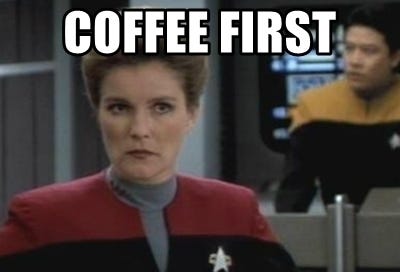Resistance *might be* futile
A few weeks ago I wrote an issue about how I’d finished a draft of my novel-in-progress only to be disappointed that in some core way it was still not the book I’d intended to write.
I didn’t mean that the plot had gone off in its own direction or that the writing itself was disappointing. It was that the heart of the book — the theme that had lit the fire under me to write it — was buried too deep under things that had been interesting and fun to write but that weren’t telling the right story.
Once I realized this, I recommitted myself to the project and fell back in love with it. But since then, I’ve been thinking a lot about resistance — specifically how and why we resist certain feedback, even when we’ve solicited it from trusted writer-friends.
When I first drafted this novel, I was fortunate to have two mentors reading my pages, and one of them pointed this problem out to me very early on. Almost half the book was told in backstory, and she couldn’t see how it related. She encouraged me to work on the story of the present, which she felt I was more invested in.
While I trusted her feedback on so many aspects of the novel, I absolutely could not understand why she couldn’t see how the backstory related. It was half the book. It explained everything my characters did in the present. If I was invested in anything, it was keeping the backstory.
Needless to say, she could tell I was attached, so she worked with me to improve it, but she also tried a few more times, in vain, to persuade me to rethink. As a compromise, I cut some of the backstory, but most of it remained.
Here’s the thing. As a reader, I’m one of those people who loves backstory. Give me backstory all day long, and I’ll eat it up. It’s one of the unique things about storytelling that makes it so compelling to me — the chance to exist in another person’s head and know their past intimately, know what makes them tick in a way you never could with a person in real life. Backstory is magic.
But despite my grand love of backstory, I couldn’t get my novel where I wanted it, and I couldn’t figure out why. So I put it in a drawer. By the time I came back to it, I’d written two others. And even though each project has its unique challenges, I like to think I’ve learned something about crafting a satisfying narrative. (Also, in the meantime, my agent told me to reevaluate the backstory too. Ha!) Finally, it became clear that my mentor had been right.
In the case of my novel, backstory had become a distraction. A shiny, tempting distraction that, much to my dismay, I now can see was not serving the story. I am indeed more invested in the present story, and I hadn’t committed to it.
Something this whole experience has me thinking about is how we can tell when our resistance to critical feedback stems from a genuine sense of confidence that we’re achieving what we set out to do, rules be damned (which is entirely valid), and when it’s stubborn refusal to see that something isn’t working.
I don’t have any satisfying answers to this dilemma. Often it can be difficult to interpret feedback altogether, because even though a reader might be right that something isn’t working, they may not be pointing to the actual culprit. As a wise person once told me, their diagnosis might be correct but not their prescription.
So what do we do? I think sometimes we simply need time away from a project so we can return to it with fresh eyes, and sometimes we need to work on keeping an open mind, and sometimes we need to approach our work with a greater sense of play. And sometimes, we need to dig our heels in and trust that we know what’s best for our own work.
But I’m afraid that time is truly the most effective way to see the solution, and for those of us who are impatient, that can be a hard pill to swallow. So maybe there’s another way?
This week, if you’re feeling resistance to a particular piece of feedback, give yourself some space to reflect on where the resistance is coming from. Don’t try to do anything about it. Just live with it and let it work on your heart and imagination. Maybe that will begin to lead you in the right direction.
Meanwhile, I look forward to next time.
Yours,
Jen





